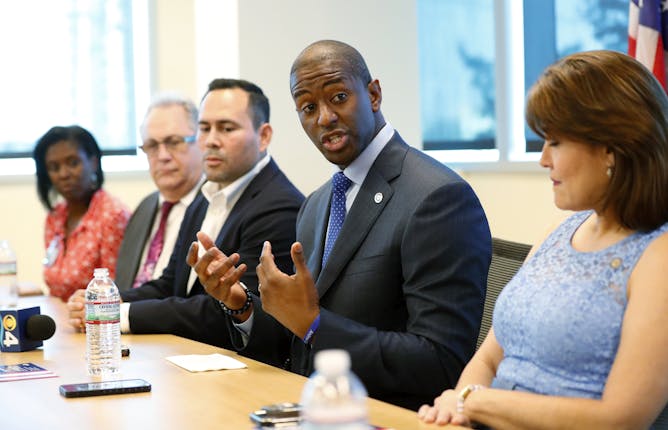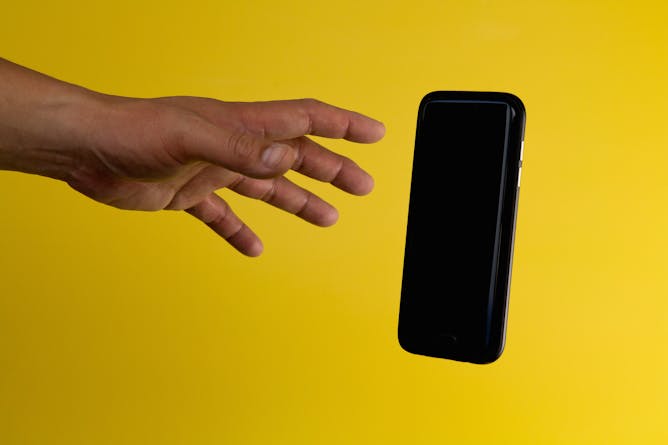Editor's note
|
|
Americans may be divided on many issues, but this midterm election season has shown a strong desire for access to health care. But “access” is not as simple as providing insurance to people with pre-existing conditions, explains health finance expert J.B. Silvers of Case Western University, because access means different things to different people. “A narrow definition of ‘access,’ coupled with ideological commitment to completely unfettered markets, even if they fail many potential customers, leads to this dilemma,” writes Silvers.
Last year, the American Academy of Pediatrics released new screen time recommendations: No more than one hour of screen time for children ages 2 to 5. But for older children and teens, they simply caution against too much screen time – there’s no suggested limit. Psychologist Jean Twenge thinks this directive is too vague. She makes the case for specific screen time guidelines for teens, pointing to new research showing that
teens are the most vulnerable age group when it comes to the negative effects of too much screen time.
One of the big questions is whether we’re alone in the universe or, is there other life out there? As space scientists canvass our own solar system for signs of life, they’ve been careful to try not to contaminate other worlds with Earthling life. Vanderbilt astronomer David Weintraub worries that sending human astronauts to Mars will by default contaminate our neighboring planet – and at the same time make it hard to tell
if the red planet is home to its own Martian life.
|
Lynne Anderson
Health + Medicine Editor
|

|
|
Top Stories
|

Florida gubernatorial candidate Andrew Gillum speaks with health care professionals on Sept. 21, 2018 in Miami.
Wilfredo Lee/AP Photo
J.B. Silvers, Case Western Reserve University
The campaign trail has been filled with talk about health care coverage, especially pre-existing conditions. While it may sound like both parties are on the same page, their ideas dramatically differ.
|

If screens are kept at an arm’s length, measures of well-being tend to improve.
SawBear/Shutterstock.com
Jean Twenge, San Diego State University
As their kids get older, should parents should be more – not less – vigilant?
|

Once people get there, Mars will be contaminated with Earth life.
NASA/Pat Rawlings, SAIC
David Weintraub, Vanderbilt University
Space researchers have had a careful approach to robotic exploration of Mars and been hands-off toward Europa and Enceladus. Why is human exploration – and inevitable contamination – of Mars different?
|
Environment + Energy
|
-
Daniel R. Petrolia, Mississippi State University; William C. Walton, Auburn University
Oysters are big business along the Gulf Coast, but raising them off-bottom – which yields a premium product – is just starting there. Hurricane Michael showed it won't be easy.
-
Phil Levin, University of Washington; Ian P. Davies, University of Washington
Communities that are majority black, Hispanic or Native American are over 50 percent more vulnerable to wildfire compared to other communities.
|
|
|
|
|
|
|
|
From our International Editions
|
-
Faiza Hirji, McMaster University
Recent rumours of Apu's demise may be exaggerated but his presence has been slowly written out of 'The Simpsons,' and many feel it is time for the stereotyped Indian-American character to go.
-
Roger Barlow, University of Huddersfield
Scientists at Cern's Large Hadron Collider have seen something that may force us to abandon everything we thought we knew about the world on the level of particles.
-
Liz Conor, La Trobe University
The image, depicting a group of Indigenous people resisting their enslavement, predates the next oldest image by 75 years.
|
|
|
|
| |
| |
|
|